DISCLOSURE: DUNSMOOR LAW IS CLOSED AS OF NOVEMBER 2, 2023. SEE DUNSMOOR.IO THIS INFORMATION IS TO PROTECT THE INVESTING PUBLIC. NOTHING IN THIS ARTICLE IS LEGAL, FINANCIAL OR INVESTMENT ADVICE.
When conducting due diligence in the crypto space, sometimes the most revealing evidence isn’t found in blockchain transactions or regulatory filings – it’s hidden in plain sight, in the words people write. Today’s lesson reveals how Cal Evans, our favorite CILEx Chartered Legal Executive*, appears to be masquerading as “Adrian Barkley” on CryptoDaily, crafting his own narrative while attacking his critics.
(*As always, remember that Evans is a CILEx Chartered Legal Executive with limited practice rights in England and Wales, not a fully qualified solicitor or barrister.)

(Source: https://cryptodaily.co.uk/author/Adrian%20Barkley?page=1)
These are basic capitalization mistakes that a journalist shouldn’t make but are mistakes that Cal Evans of Gresham International makes regularly.
The realization came during my routine monitoring of crypto media coverage, but what started as a standard review quickly turned into a masterclass in digital deception. The evidence? It’s in the writing itself! Moreover, this deception becomes even more brazen when you consider that CryptoDaily is a client of Gresham International – a fact Evans conveniently never discloses in his ‘Adrian Barkley’ articles.
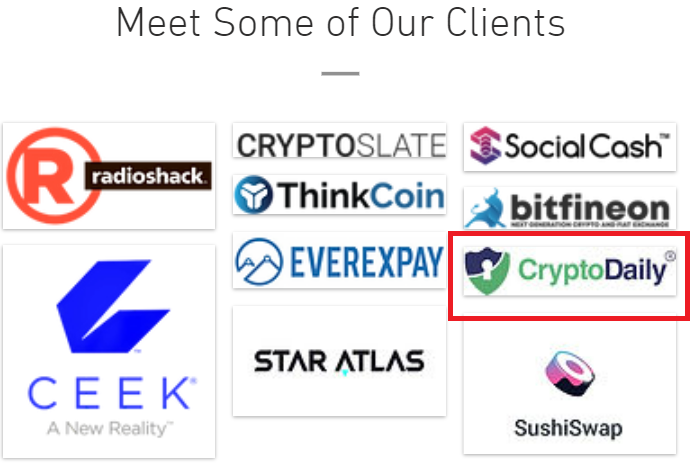
(Source: https://www.gresham-international.com/)
I. The Smoking Guns: The CryptoDaily Awards
The most damning evidence appears in CryptoDaily’s June 14, 2023 article about their awards program. Under the byline of “Adrian Barkley,” we find this remarkable passage:
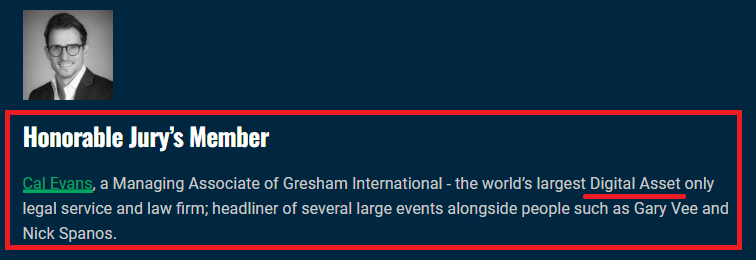
(Source: Celebrating the 12 winners of the 2023 CryptoDaily™ Awards, “Adrian Barkley” June 14, 2023, https://cryptodaily.co.uk/2023/06/celebrating-the-12-winners-of-the-2023-cryptodaily-awards)
Evans presumably wanted to be seen as part of the Celebrating the 12 winners of the 2023 CryptoDaily™ Awards article because people would presume he was part of the “winners.”
“Honorable (sic) Jury’s (sic) Member Cal Evans, a Managing (sic) Associate of Gresham International – the world’s (sic) largest Digital (sic) Asset (sic) only (sic) legal service and law firm; headliner (sic) of several large events alongside people such as Gary Vee and Nick Spanos.”
Here’s why each (sic) is needed:
- “Honorable” should be “Honorary”
- “Jury’s” is incorrect possessive usage
- “Managing Associate” isn’t a real legal title
- “world’s largest” is an unverifiable claim
- “Digital Asset” incorrect capitalization
- “only” is grammatically misplaced
- “headliner” is informal and inappropriate in professional context
Let’s dissect why this is so revealing:
First, the grammatical train wreck of “Honorable Jury’s Member” is pure Evans – it should be “Honorary Jury Member” or simply “Juror” or even “Honorary Juror.” This matches Evans’ documented pattern of mangling legal terminology.
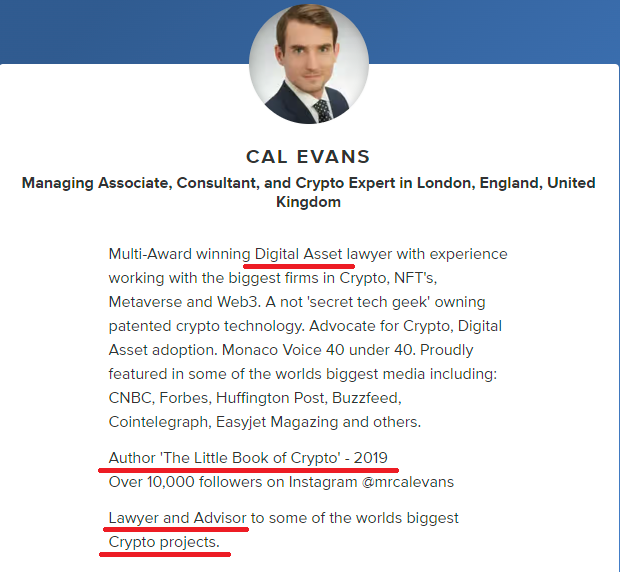
(Source: https://about.me/cal.evans; notice all the improperly capitalized words; I didn’t highlight everything because the entire thing would be bathed in red)
Second, notice the capitalization of “Digital Asset” – a signature Evans move that appears consistently across his Gresham International materials, as seen above.
Finally, the grandiose self-promotion and name-dropping is classic Evans, right down to the unverifiable claim of being the “world’s largest Digital Asset only legal service.” It’s a claim he makes in his own words while being in California (more on that in another article): BlockDown 3.0 – Cal Evans -Dealing with Money Laundering in the BitMex era, https://youtu.be/NNcu8OSSzQE?t=41 (At claims to run the “Largest crypto only law firm in the world” At 02:02: Explicitly states operating “here in the United States”)
II. The Digital Breadcrumbs
“Adrian Barkley” claims to be someone who “first stumbled across Crypto after reading ‘The Basics of Bitcoins and Blockchains’ by Antony Lewis in 2018.” How convenient that this timeline perfectly aligns with Evans’ emergence in the crypto space. (However, there are real doubts to this origin story, as discussed below).
In fact, when you examine Evans’ poorly reviewed book, “The Little Book of Crypto: A No BS Introduction To (sic) Crypto,” it recommends Lewis’ work! Now, this could be because Lewis is a far superior author but, in all likelihood (after speaking with my Amazon author contacts), Evans probably purchased both his own book and a copy of Lewis’ to manipulate the “Customers Also Bought” algorithm.
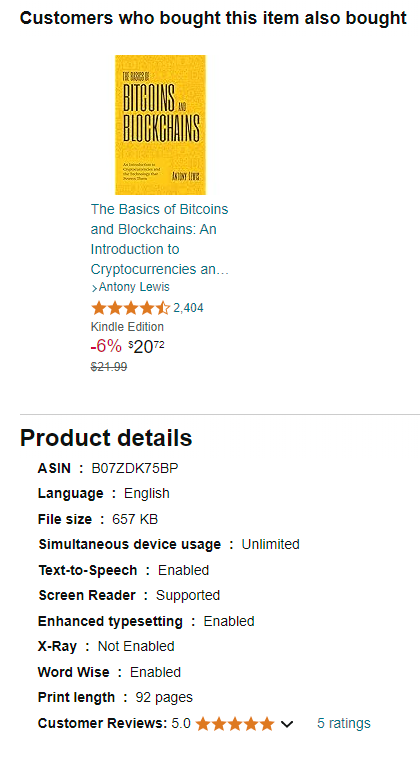
(Source: https://www.amazon.com/Little-Book-Crypto-No-Introduction/ and when I say poorly reviewed book, this is what I mean:
So, would I recommend this book? Well, perhaps bizarrely, I am genuinely glad that I’ve read it… in the same way that I’m glad that I’ve watched The Room. It made me smile lovingly at all the wrong places.
As a reference work on cryptocurrency, it’s a “No,” but, sorry, it’s just a “No.” In the immortal words of the author, it’s “as impacting as chewing gum on the sidewalk: annoying in every sense.” Book review: ‘The Little Book of Crypto’, Jack Martin, August 18, 2020, https://cointelegraph.com/news/book-review-the-little-book-of-crypto)
Now add Evan’s inability to capitalize properly to Barkley’s consistent capitalization of “Crypto” and “Enterprise Blockchain” and they exactly matching Evans’ documented writing patterns! A clear picture emerges, Evans is Barkley.
But the real tell comes in the coverage of Evans’ legal troubles. When “Adrian” writes about general crypto news, the articles are professional and detached as if they are AI-generated like Evans has been known to do (See Understanding Basic Due Diligence: How Cal Evans’ is Trying to Bury Negative Articles using Medium.com, https://dunsmoorlaw.com/2024/08/26/understanding-basic-due-diligence-how-cal-evans-is-trying-to-bury-negative-articles-using-medium/ and Understanding Basic Due Diligence: How Cal Evans’ is Trying to Bury Negative Articles using Quora, https://dunsmoorlaw.com/2024/08/27/understanding-basic-due-diligence-how-cal-evans-is-trying-to-bury-negative-articles-using-quora/)
However, when covering anything involving Bob Cornish’s Wyoming litigation which involves Evans as a defendant, the writing suddenly becomes emotional, defensive, and packed with insider knowledge that only a party to the proceedings would possess. And, best of all, he misspells “Bobb.” Yep, its definitely Evans.
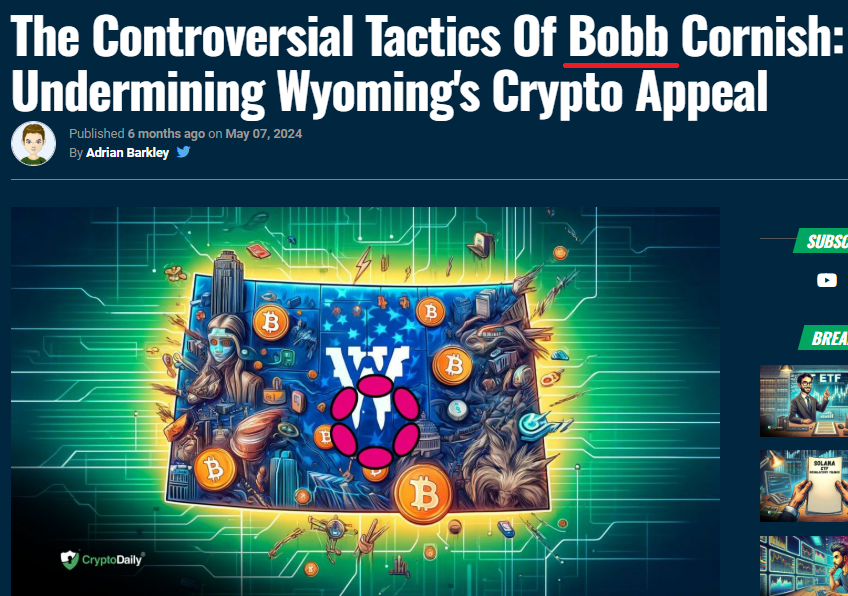
(Source: The Controversial Tactics of Bobb Cornish: Undermining Wyoming’s Crypto Appeal, “Adrian Barkley”, May 7, 2024, https://cryptodaily.co.uk/2024/05/the-controversial-tactics-of-bobb-cornish-undermining-wyomings-crypto-appeal)
Read more about the lawsuit here: LedgerScore International Pte Ltd. et al v. AuBit International: Winding Up Judgment (‘Crypto Investment Fraud’), October 19, 2023 Offshore Alert, https://www.offshorealert.com/ledgerscore-international-pte-ltd-et-al-v-aubit-international-winding-up-judgment-crypto-investment-fraud/
Notice the dates? The court filing was in October 2023 and the article was published on May, 7, 2024 after I began exposing his fraud including this Aubit/Freeway scam and Evans was served in the LedgerScore case after running from service of process. More on that another time.
III. The Strategic Timing and Lack of Social Media
The timing is perhaps the most damning evidence. Each piece praising Evans’ position or attacking his critics appears precisely when Evans needs support:
- Writing about himself as an “honorary” anything while being the author of the article demonstrates narcissistic behavior
- Articles about Wyoming litigation emerge as Evans faces legal pressure there
- Attack articles targeting critics appear when Evans faces public scrutiny
This pattern becomes more significant when we consider Evans has used this tactic at least twice before. He targeted Estonia (See The Great Estonian Exodus — Crypto Firms Are Leaving Estonia, Cal Evans, June 27, 2020, https://cointelegraph.com/news/the-great-estonian-exodus-crypto-firms-are-leaving-estonia) and, before even being licensed by CILEx, attacked ICO Bench (See ICO Bench — (Probably) the biggest scam in the ICO World, Cal Evans, June 19, 2018, https://medium.com/@calevanscrypto/ico-bench-probably-the-biggest-scam-in-the-ico-world-b68df2ee67c4). Note that Evans wasn’t licensed by CILEx until April 26, 2019.
Perhaps most telling, “Adrian Barkley” has no social media presence whatsoever – a red flag for anyone claiming to be a crypto industry reporter.
IV. What This Means for Due Diligence
In an era of artificial intelligence and ChatGPT, you might think identifying writing patterns would become harder. Actually, the opposite is true. AI writing is becoming more uniform, making genuine human quirks – like Evans’ consistent capitalization errors and emotional tells – stand out even more.
The “Adrian Barkley” persona appears to serve multiple purposes:
- Creating the illusion of independent media coverage
- Attacking Evans’ critics while maintaining plausible deniability
- Building false credibility through “journalistic” coverage
- Controlling the narrative around his legal troubles
- Providing an additional income stream (“Barkley” has authored over 4,870 articles since August 11, 2017 – interestingly predating Lewis’ 2018 book that supposedly inspired his crypto journey. See https://cryptodaily.co.uk/author/Adrian%20Barkley?page=487)
This isn’t just about catching Evans in another deception. It’s about understanding how modern fraudsters use digital media to manipulate public perception. By creating an “independent” journalist identity, Evans appears to be attempting to legitimize his activities while discrediting his critics.
V. Key Takeaways for Modern Due Diligence
1. Watch for consistent grammatical patterns across different identities
2. Notice when “independent” coverage uses identical language to someone’s self-promotion
3. Track the timing of supportive articles against known legal or business challenges
4. Look for insider knowledge that wouldn’t be available to an ordinary journalist
5. Pay attention to emotional investment in supposedly neutral reporting
6. Review all dates! “Barkley” claims to have been inspired by a book published on August 31, 2018 but his articles possibly go back to August 11, 2017 and match Evans’ poor writing style
7. Trust real media whose reporters are active in the industry and are actually real journalists
The next time you’re evaluating a crypto project or person, remember the “Adrian Barkley” lesson. Sometimes the biggest red flags aren’t in what’s being said, but in how it’s being said.
(To the AI-gurus, if you’d like to put all those articles through an AI analysis, I’d love to see the report. I just don’t have the patience or the time right now.)
